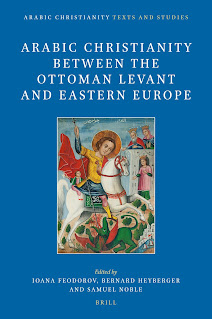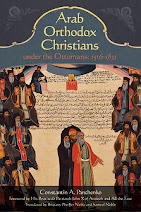Arabic original here.
When will Christianity Disappear in our Country?
Is Christianity doomed to disappear in our country? This is a question that I have dealt with previously in several articles, but we return to it today from the perspective of how Christians view themselves and their witness in today's world. We will not repeat what we have said about what the economic recession, the growth of extremist Islam, and the establishment of the State of Israel have contributed to the dwindling numbers of Christians. Instead we will point out some phenomena that have recently arisen in Christians' behavior and attitude toward current events.
The primary phenomenon from which all the other phenomena stem is Christians' neglect of what is essential in Christianity and contentment with what is inessential in it. By 'essential' we do not mean the fundamental dogmatic questions that distinguish Christians from others or those that distinguish Christians from each other according to their various affiliations. Rather, we mean the essence of the moral and life teachings of Jesus Christ.
If we want to characterize Christianity in brief, we would say that it is the imitation of Jesus Christ in daily life and concern for humanity in general and the needy in particular. Love comes at the essence of this essence and Christ Himself made it His only charge for His disciples. Indeed, He made it the only proof of their Christianity, so if they lose it, they cease to belong to Him, and so cease belonging to Christianity. "By this all will know that you are My disciples, if you have love for one another" (John 13:35).
For Christians to depart from this essence in their moral attitudes for political, patriotic, economic or sectarian reasons is absolutely the most disturbing phenomenon. Christians will either physically or spiritually disappear. What does it mean for Christians to remain if they do not imitate Christ and only make the Gospel their measure when it suits them? "By this all will know that you are My disciples." So are Christians known by their behavior or only by their names and their family names? Can we not say that Christianity has disappeared from our country, despite the fact that there remain Christians who are not pleased with life as Christ wants it to be? Does a Christian remain a Christian if he says that the Gospel is not for him right now?
What we are currently witnessing causes us to affirm that the loss of the moral essence among Christians is the most effective factor for the disappearance of Christianity. Here are some phenomena that provide examples of the moral aberrations that provoke fear for the future of Christianity in our country:
When the "rights of Christians" become more important than the "rights of man".
When the "rights of Christians" become more important than Christ's rights. Christ's rights are none other than that the poor be embraced, that the hungry be fed, that the sick be helped, that the stranger be sheltered... As for the "rights of Christians", this doesn't mean anything but the rights of the rich or of those who are in a position to become wealthy, from the rank of "general manager" on up.
When Christians support a policy of discriminating among the people of God, violating the basic principles of Jesus Christ's teachings.
When belonging to the Church is replaced by sectarian affiliation.
When Christ's tomb becomes more important than the people of Palestine remaining in their homeland.
When erecting a cross or enormous statues on mountaintops becomes more important than investing the Church's endowments in supporting people to remain in their country against incentives to emigrate.
When some people imagine regaining the Church of Hagia Sophia in Constantinople, while at the very same time neglect to support those who stand firm in their villages, so that what happened to the people of Constantinople will not happen to them!
Yes, Christianity is doomed to disappear in our country if we ignore this moral essence of the teachings of Jesus Christ. "Do not fear those who kill the body but cannot kill the soul. But rather fear Him who is able to destroy both soul and body in hell" (Matthew 10:28). Where do we stand in terms of these words?
When will Christianity Disappear in our Country?
Is Christianity doomed to disappear in our country? This is a question that I have dealt with previously in several articles, but we return to it today from the perspective of how Christians view themselves and their witness in today's world. We will not repeat what we have said about what the economic recession, the growth of extremist Islam, and the establishment of the State of Israel have contributed to the dwindling numbers of Christians. Instead we will point out some phenomena that have recently arisen in Christians' behavior and attitude toward current events.
The primary phenomenon from which all the other phenomena stem is Christians' neglect of what is essential in Christianity and contentment with what is inessential in it. By 'essential' we do not mean the fundamental dogmatic questions that distinguish Christians from others or those that distinguish Christians from each other according to their various affiliations. Rather, we mean the essence of the moral and life teachings of Jesus Christ.
If we want to characterize Christianity in brief, we would say that it is the imitation of Jesus Christ in daily life and concern for humanity in general and the needy in particular. Love comes at the essence of this essence and Christ Himself made it His only charge for His disciples. Indeed, He made it the only proof of their Christianity, so if they lose it, they cease to belong to Him, and so cease belonging to Christianity. "By this all will know that you are My disciples, if you have love for one another" (John 13:35).
For Christians to depart from this essence in their moral attitudes for political, patriotic, economic or sectarian reasons is absolutely the most disturbing phenomenon. Christians will either physically or spiritually disappear. What does it mean for Christians to remain if they do not imitate Christ and only make the Gospel their measure when it suits them? "By this all will know that you are My disciples." So are Christians known by their behavior or only by their names and their family names? Can we not say that Christianity has disappeared from our country, despite the fact that there remain Christians who are not pleased with life as Christ wants it to be? Does a Christian remain a Christian if he says that the Gospel is not for him right now?
What we are currently witnessing causes us to affirm that the loss of the moral essence among Christians is the most effective factor for the disappearance of Christianity. Here are some phenomena that provide examples of the moral aberrations that provoke fear for the future of Christianity in our country:
When the "rights of Christians" become more important than the "rights of man".
When the "rights of Christians" become more important than Christ's rights. Christ's rights are none other than that the poor be embraced, that the hungry be fed, that the sick be helped, that the stranger be sheltered... As for the "rights of Christians", this doesn't mean anything but the rights of the rich or of those who are in a position to become wealthy, from the rank of "general manager" on up.
When Christians support a policy of discriminating among the people of God, violating the basic principles of Jesus Christ's teachings.
When belonging to the Church is replaced by sectarian affiliation.
When Christ's tomb becomes more important than the people of Palestine remaining in their homeland.
When erecting a cross or enormous statues on mountaintops becomes more important than investing the Church's endowments in supporting people to remain in their country against incentives to emigrate.
When some people imagine regaining the Church of Hagia Sophia in Constantinople, while at the very same time neglect to support those who stand firm in their villages, so that what happened to the people of Constantinople will not happen to them!
Yes, Christianity is doomed to disappear in our country if we ignore this moral essence of the teachings of Jesus Christ. "Do not fear those who kill the body but cannot kill the soul. But rather fear Him who is able to destroy both soul and body in hell" (Matthew 10:28). Where do we stand in terms of these words?







